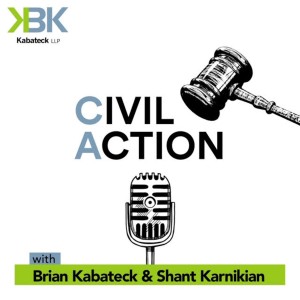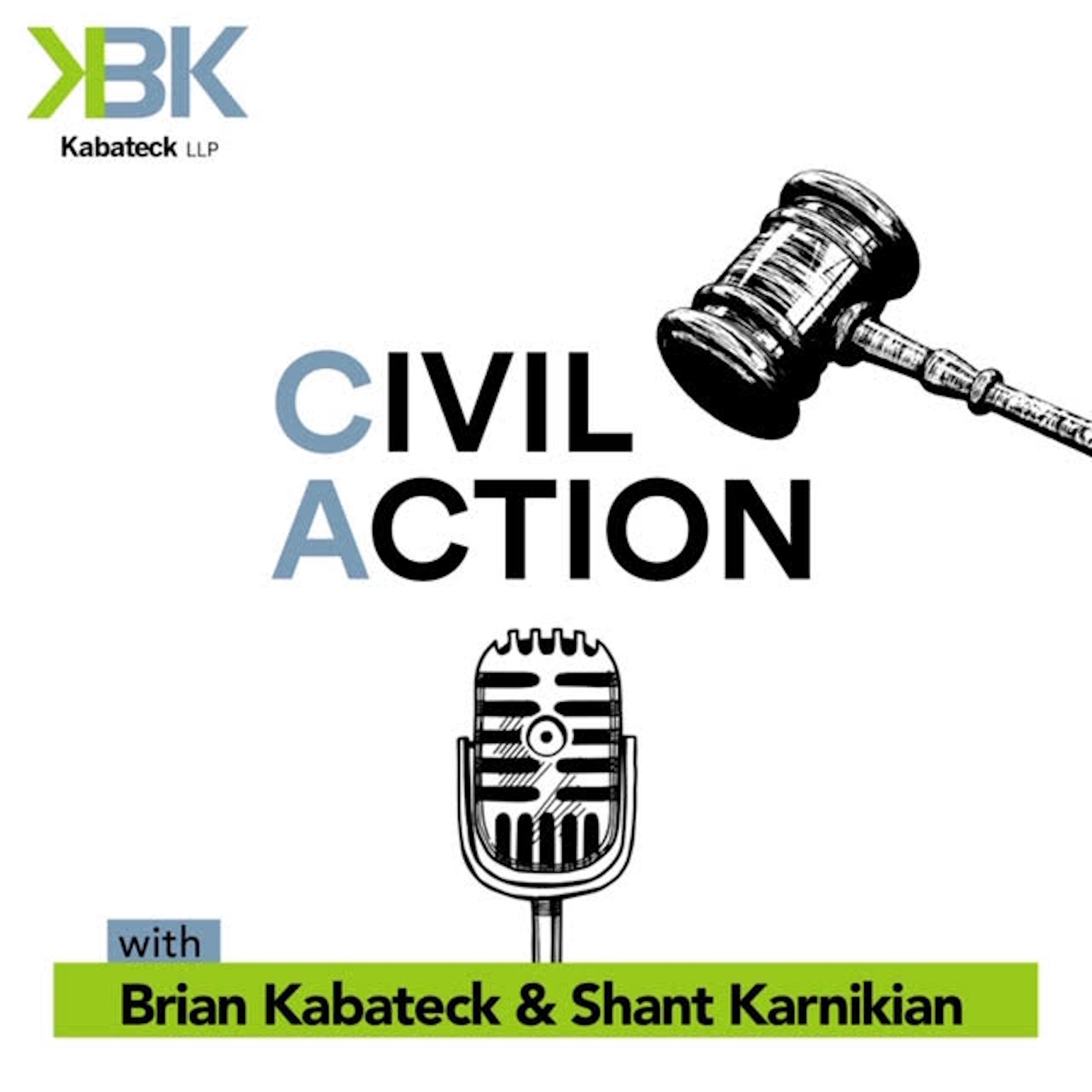Episodes

Friday Feb 07, 2020
Friday Feb 07, 2020
The former president of the CAOC discusses his first case, fresh out of law school, representing Cesar Chavez and the United Farm Workers Union for farm workers charged with strike violence. Ray comments on his experience working with Chavez and how impactful the qualities Chavez possessed were to the United Farm Workers movement. More information on Ray Boucher and his consumer law firm, Boucher LLP, can be found here: http://www.boucher.la/

Thursday Feb 06, 2020
Thursday Feb 06, 2020
Brian and Shant discuss the following cases:
Loeb v. County of San Diego: Plaintiff was in a county park campground and was injured on an uneven pathway. The county argued Trail Immunity and the court focused on whether the pathway had a dual purpose.
Kim v. Laguna Seca Raceway: Plaintiff signed a release to ride his motorcycle at the raceway and was subsequently injured. In a possible attempt to overcome the release, Plaintiff filed a motion for summary judgment for gross negligence. The court looked to whether professional racing standards can be used as a factor in attaching liability.
Rotkiske v. Klem: Klem obtained a default judgment on a collection against Rotkiske who claims he didn’t learn about it until he attempts to refinance his home. Rotkiske raised the Discovery Rule and whether it applies after the statute of limitation of one year expired on Rotkiske’s action.
Mutasas v. Happy Valley Copy Center: An intern of a conference center belonging to the Community of Christ Church claims sexual harassment from the director of the conference center. The court looks to the Single Employer Doctrine and the integrated enterprises test to determine whether employment relationship exists.

Tuesday Feb 04, 2020
Tuesday Feb 04, 2020
Brian and Shant discuss the following cases:
Hood v. Gonzalez: A nightmare client who had gone through five lawyers. The client signed the settlement agreement but refused to sign the check then the court appointed an elisor to endorse the check in lieu of the client’s endorsement.
Soni v. SimpleLayers, Inc.: An untimely request to arbitrate in a fee dispute leads to a $2.50 award. The critical issue is whether the clock starts to run to make a demand from the moment the award is received or when the demand is dropped in the mail.
Fabian v. Renovate America: Solar panels were attached to the plaintiff’s home and a deed was taken out on the plaintiff’s home for payment. In response to the plaintiff’s lawsuit, Renovate files a petition to compel arbitration grounded on the theory that the plaintiff signed the contract via DocuSign.
ENA North Beach, Inc. v. 524 Union Street: A restaurant-tenant sued the landlord claiming misrepresentation in leasing the space. Permits were allegedly included in the lease but were not obtained. The court ruled in favor of the tenant and punitive damages were awarded.

Friday Jan 24, 2020
Friday Jan 24, 2020
Steve discusses his journey and determination to make it through law school and find success in his practice. Steve goes into great detail about one of the most influential cases of his career and how it helped shape his future practice. More information about Steve Vartarzarian and his team’s work can be found here: http://thevlf.com/

Thursday Jan 23, 2020
Thursday Jan 23, 2020
Brian and Shant discuss the following cases:
Johnson v. MGM: Plaintiff argues that the District Court did not do an appropriate calculation to determine attorney fees and in response, the District Court lays out multiple factors to determine the appropriate percentage.
Handoush v. Lease Finance Group: For Choice of Law to be enforceable, CA looks to whether the application of another state’s law would violate primary substantive rights. Moreover, in CA parties cannot waive the right to a jury trial prior to the dispute, but in a state where the law is not an inviolate right then the parties can waive the right to a jury trial.
Silbaugh v. Elaine Chow (DOT): When suing a government agency, the party pursuing the agency must name the head of that agency. However, the plaintiff simply named her supervisor and not the head of the agency. In the time it took to cure the defect, the Statute of Limitations had run baring the lawsuit. The Relation Back Doctrine however allows an amendment relates back to the original filing if it relates back to the original conduct or occurrence.
Wishneb v. Northern Mutual Life Insurance: Plaintiff charged with compounded interest after borrowing money from his life insurance policy arguing a violation of usury laws. In 1918, California instituted usury laws with provisions laying out a blanket percentage in order to prevent over-charging due to compounded interest. However, in 1934, California realized the system required adjustment giving the power back to the legislature.
Have questions for us? You can reach us at 213-217-5000, or visit our website at www.kbklawyers.com.

Tuesday Jan 21, 2020
Tuesday Jan 21, 2020
An esteemed trial attorney in the state, Bill’s practice focuses on personal injury and product liability. Bill recollects one of his more memorable first trials where he was defensed but ultimately won on appeal and settled the matter favorably. Bill associates a lot of his success to that case and how it taught him how to persevere through a difficult trial. Bill encourages young lawyers to find their way into the courtroom in legal profession where trial experience is steadily decreasing. More information about Bill Shapiro can be found here: https://wshapiro.com/

Saturday Jan 18, 2020
Saturday Jan 18, 2020
Casey is a second-generation Southern Californian and the first in his family to graduate from college. A graduate of USC Gould School of Law and a partner at Aitken Aitken & Cohn, Casey’s practice is focused on single incident personal injury cases, elder abuse, professional medical malpractice, and insurance bad faith. Casey is most passionate about his work in insurance bad faith and elder abuse. Casey believes the biggest threat to plaintiff lawyers is the consideration of implementing AI in practice and having hedge funds come in to purchase law firms under the guise of access to justice. Casey is also passionate about LGBT rights as a past president of the Orange County Lavender Bar Association which will be celebrating its 10-year anniversary in 2020. More information on Casey Johnson and his practice can be found here: https://www.aitkenlaw.com/

Friday Jan 17, 2020
Friday Jan 17, 2020
Brian and Shant discuss the following cases:
Brown v. Upside Gating: Defendants file an appeal to a judicial order arguing that it was tantamount to an injunction because it required appellants to take affirmative steps to affect invalidation of the releases at issue. The court clarifies that an order is not an injunction and therefore not appealable.
Williams v. Impacts Lab, Inc.: Plaintiffs were provided leave to amend their complaint to add a new plaintiff as a class representative. Unfortunately, counsel filed the amended complaint with the same plaintiff and yet again defendant’s motion was granted. In order to apply, an appeal must derive from something dispositive in the case.
Death Knell Doctrine – a de-facto final judgment for absent plaintiffs under circumstances whereto the persistence of a viable plaintiff claim creates a risk – no formal final judgment will be entered. In order for the doctrine to apply, all class allegations must be disposed, because a partial rejection of allegations is not enough.
Henson v. Fidelity: Plaintiffs filed a class action for RESPA violations involving real estate. The district court judge throws everything out but a sliver of the case making it unappealable. Thereafter, the parties enter into an agreement to dismiss for purposes of preserving an appeal. However, USSC in Microsoft v. Baker ruled that parties cannot stipulate to appellate jurisdiction.
Assembly Bill 9: Stop Harassment and Reporting Act (SHARE) extends the statute of limitations exclusively for employment discrimination. A FEHA letter/complaint must be filed within three years, extended from one year, from the incident(s) that is actionable.

Friday Jan 10, 2020
Friday Jan 10, 2020
Mary Alexander – Mary’s practice is comprised of product liability, toxic tort, auto accidents, pharmaceutical cases, and class actions. With an undergraduate focus in science and an objective toward biology and toxicology, she has handled cases that address environmental and workplace risks associated with the use of dangerous chemicals. Mary recently completed a 19-year long journey trying a matter involving led-based paint. Filed in 2000, she successfully pursued paint companies that manufactured, sold, and promoted led-based paint for use in homes and work environments. More information on Mary Alexander is available here: https://maryalexanderlaw.com/

Thursday Jan 09, 2020
Thursday Jan 09, 2020
Brian and Shant discuss the following cases:
Monster Energy Company v. City Beverages LLC: When must the arbitrator disclose information regarding their financial interest in the arbitration company, and whether an unfair advantage exists when the arbitration company has handled numerous arbitrations for the advantageous party.
Nayab v. Capitol One Bank: What determines an “injury” under Article III when a consumer’s credit report is run without prior approval? And, what can the consumer do to prevent that conduct in the future?
Stafford v. Attending Staff Association of LAC & USC Medical Center: Whether an elderly physician forfeited his right to administrative remedies when he chose to file an unsuccessful action in superior court prior to concluding the administrative appeal process.
Davis v. TWC Dealer Group: Not one, but three separate contracts of adhesion from a car dealership to a family tasked with running the finance department. What constituted substantive and procedural unconscionability and the need for both to exist in order for the claim to survive.

